Site Search Reality Check
Last Updated Mar 2009
By Mark Bennett, New Idea Engineering, Inc. - Volume 3 Number 1 - January 2006
This is the premiere of our new "Site Search Reality Check" column.
In each issue we'll select a web site and provide constructive ideas on how their site search could be improved. Many of these ideas are also directly applicable to enterprise search engines and portals running inside private intranets. If you'd like us to feature your site in a future issue, or have ideas for other sites that could use a little site search tweaking, please drop us a line.
This month: Data Junction
On previous projects we had used a great data conversion utility called Data Junction that could import and export data between most of the major databases such as Oracle and Microsoft SQL Server. Recently, when one of our clients faced some data conversion issues, we mentioned Data Junction to them. When they sounded interested, I wanted to send them the URL to download a trial copy. Imagine my surprise when I double checked http://datajunction.com and found the product was no longer at that URL!
The Adventure Begins
Before sending clients a URL, I often double check that they still exist. When I went to http://datajunction.com I found it to be occupied by a "domain squatter", a company that holds a popular URL in hopes of selling it. It says "datajuction.com", but if you look carefully you'll notice all the generic entries and the "Popular Categories". I got the same with www.datajunction.com. See Figure 1a.
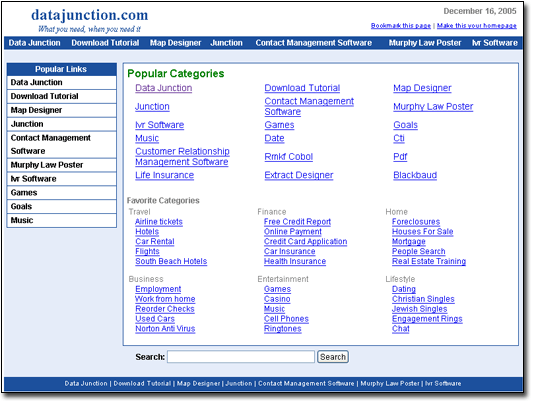
Figure 1a
This was really strange; I could have sworn that I had the right URL! Maybe my notes were wrong? I double checked with a quick Google search; it brought back the same results, http://datajunction.com, as you can see in Figure 1b.
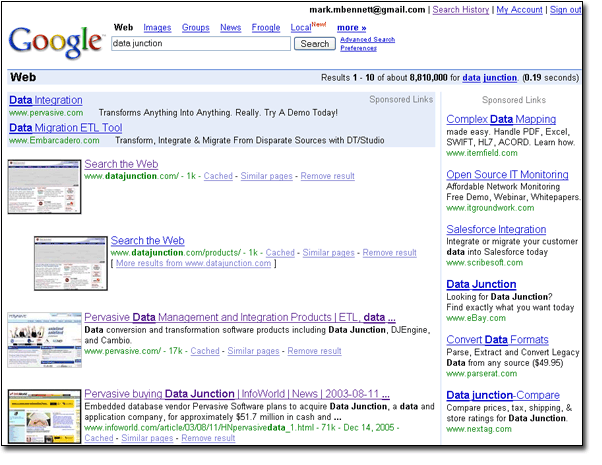
Figure 1b
Well, if my notes were wrong, at least I'm good company.
Is That Really You?
When I did my Google search, I noticed some results had links to Pervasive Software, http://www.pervasive.com, so I visited their site shown in Figure 2.
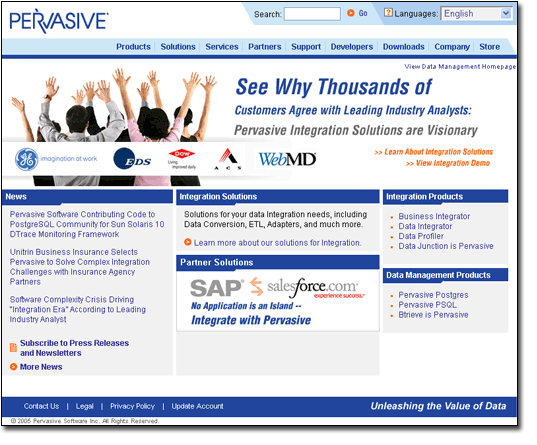
Figure 2
This didn't look what I expected; there was nothing about Data Junction, but at least it was a software company. Google did return quite a few references to Data Junction, including many awards, some as recently as 2002 and 2003.
Software companies do merge and acquire each other, so I decided to poke around the Pervasive site. I looked at the top menu, the only two options that looked promising were "Products" and "Solutions", I figured a conversion utility would be product. Under Products menu they offer "Integration" and "Data Management" – those both sounded like possibilities. The closest sounding match was their Data Management "DataExchange" product, shown in Figure 3a.
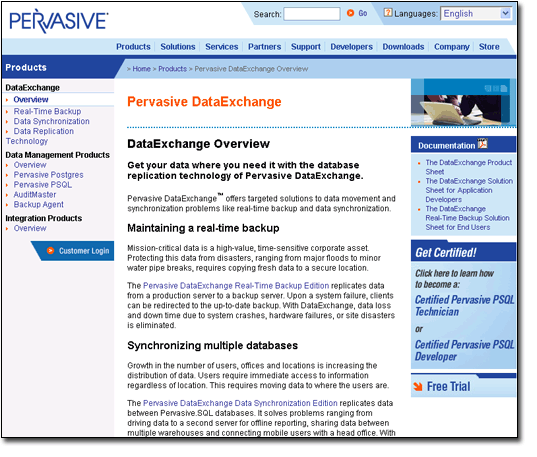
Figure 3a
The page talks about data backup, but that wasn't what I wanted, I wanted to convert. It also talked about synchronizing multiple databases – I suppose that could be it, but really sounds like overkill, I just want an occasional batch conversion. More importantly, this page did not have the word "junction" on the it; nor the words "convert" or "conversion" so surely this was not the right place.
Back to the main page. The "Integration" menu offered "Data Integrator" and "Integration Manager". "Integrator" also sounded like more than what I wanted - see Figure 3b - but I tried it anyway. No luck - no "data junction".
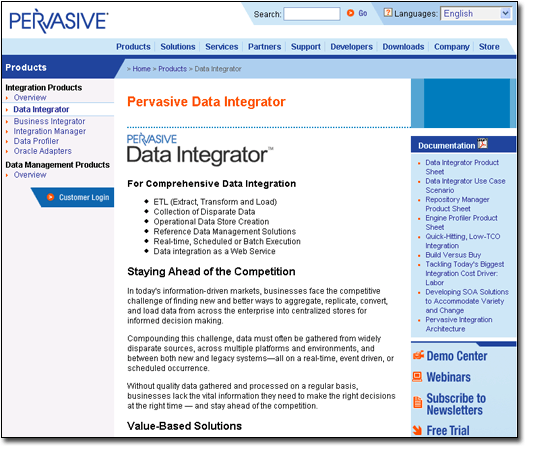
Figure 3b
A casual user might hav given up there, but I really wanted to find out what happened to a very cool product. Aha! A search box!
Bring on the Site Search!
Many surveys talk about the large percentage of users who will use site search if it's available, on the order of 40 to 50%. As much as we like search, some of those surveys go on to say that the users who do use search would have used the site navigation features first, if it had been clear where to click.
This is the situation I was in. I had tried the obvious "Products" menu first, visited a couple of pages directly, and didn't find what I wanted. So I too was using search as a "Plan B" to find what I wanted.
Strike 1
I did a simple search for "data junction" as you can see in Figure 4.
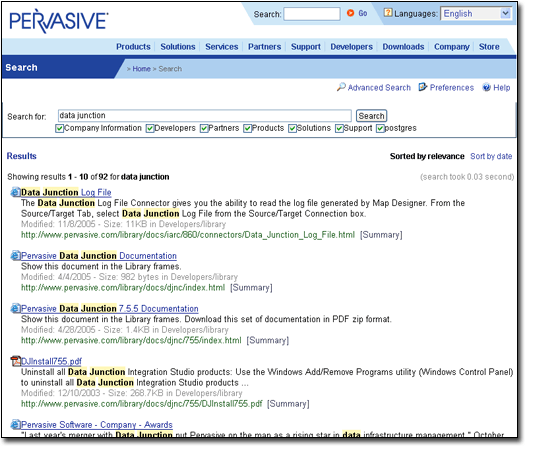
Figure 4
This was very encouraging, I got 92 hits, so at least I know I'm in the right place! But the first search result is a log file. The next 3 are links to documentation, and the 5th result is an award for the product. I clicked on the link and found the page shown in Figure 5, dated 2002.
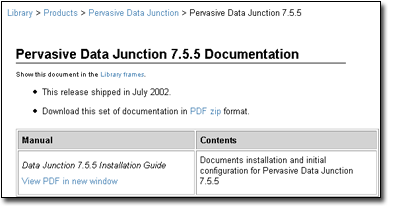
Figure 5
I had now confirmed that somehow Pervasive was the correct home for Data Junction, and it seemed likely that they had just renamed it. But I still had the bigger question of finding the main product page for it, and its new name, and also a link to download an evaluation copy.
Strike 2
Feeling quite sure that I was on the correct site, I decided to try a second search. This time I'd narrow down the scope of the search. The results list had checkboxes for which areas of the site to search across, so I unchecked Company Information, Developers, Partners, Solutions, Support and Postgres; the only box left checked was "Products". This time I only got back 4 documents, shown in Figure 6.
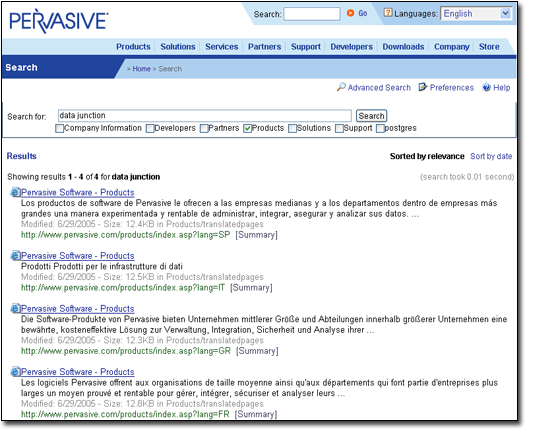
Figure 6
All four documents have the generic title "Pervasive Software Products", but if you look in the summaries you'll see a problem - none of the results are in English, and none of them have "junction" in the summary. I noticed a pattern in the 4 URLs which seemed to differ only by the last 2 letters - probably an abbreviation for the language codes. Ironic that the english version of the page did not show up in the search result list!
I opened up the Spanish page http://www.pervasive.com/products/index.asp?lang=SP and replaced the SP with EN http://www.pervasive.com/products/index.asp?lang=EN. See Figure 7 and Figure 8 respectively.
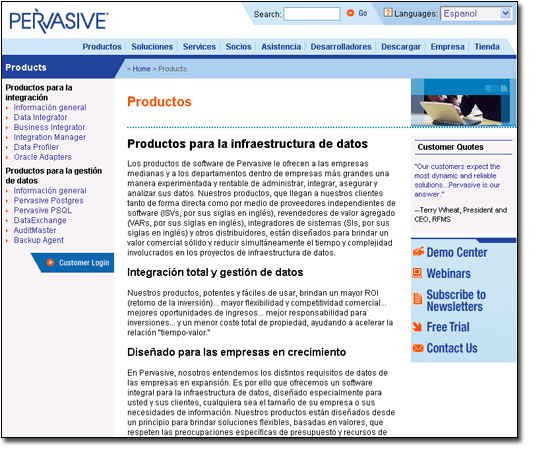
Figure 7
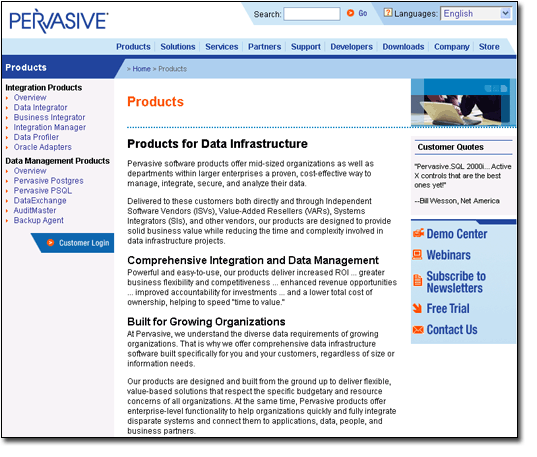
Figure 8
This still wasn't what I was looking for; the word "Junction" is still not there, though they do mention "conversion", under the "Pervasive Migration Toolkit" So "Data Junction" was now called "Migration Toolkit"!
Time for a Phone Call
By this time I had definitely confirmed that Pervasive had something to do with the old Data Junction; likely they had acquired the original company and renamed the product. Which of their products was the Data Junction I was looking for? I had seen at least 3 good candidates: "DataExchange" (my best guess), "Data Integrator", and "Pervasive Migration Toolkit". These all sounded like decent guesses. Pervasive's web site search certainly didn't enable me to answer my own questions in this case!
I gave them a call and spoke to a very polite sales person who told me "Data Junction" was now called "Data Integrator" which was my second guess based on the search results.
So Data Junction is now called Pervasive Data Integrator, and the main product page is at http://www.pervasive.com/dataintegrator/ Google filled in some of the details: Data Junction was bought by Pervasive Software in 2003, see the InfoWorld article http://www.infoworld.com/article/03/08/11/HNpervasivedata_1.html
Site Search Tweaks to Fix This
I didn't come here today to talk to you about Data Junction - I wanted to tell you about good search - or in some cases, search that could be improved. My persistence in this case is typical of sites many of us have visited; and solving simple problems like this with great site search makes for satisfied customers and lower support costs overall. All it takes is a little effort to make sure your web site has the answers to your customers' questions.Below we list some ideas about how this could be avoided. We're not suggesting that ALL these steps would be absolutely necessary, but at least worth considering. Our specific suggestions:
Administrative
Content
Meta Data
Content promotion
Search tagging
"Did you mean?"
Site thesaurus
Spider configuration
Search engine data quality
Search analytics
If possible, they should have retained the domain name datajuction.com Usually trademarks and domain names are considered intellectual property and are part of a technology acquisition.
They should have a specific landing page for Data Junction searches. This could serve as a landing page for both Google/Yahoo searches, as well as a landing page for their own site's search engine. Their current paid Google listing for "data junction" goes to an "ETL Solutions" page, which also doesn't mention Data Junction.
Though many mainstream Internet search engines have stopped using HTML meta tags such as the Description and Keywords fields due to abuse by spammers, many enterprise and site search engines still allow companies to use this within their web site. Although spammers have ruined meta tags on the public Internet, once you are within a controlled network they are still VERY valuable. Many enterprise search engines even have an option to display the Description in the results list. For example, in the Pervasive Data Integrator page they could have had:
<html>
<title>Data Junction Information Pag</title>
<meta name="description" content="Pervasive Data Integrator (formerly "Data
Junction") is a leading edge tool for database conversion and
ETL business applications.">
<meta name="keywords" content="ETL, Data Integrator, Data Junction,
data conversion, database conversion">
</head>
</html>
<body>
<head>
To reiterate, even though Google and Yahoo may not make use of this meta data, your own site search and corporate enterprise search engine still can. And since you presumably don't have fraudulent "spammers" inside your own company, this features can still work as originally intended.
At least on their own site, when a visitor searches for Data Junction, they should specifically call out the correct landing page; either the new landing page mentioned above, or the correct Data Integrator product page.
In addition to getting users to the right page, there the search should also promote a message, or a link and summary, with a message along the lines of "August 2003: Pervasive Software Buys Data Junction". This could be as simple as promoting a press release to the top of the results list, directly under the link to the main landing page.
As Google users, we are all spoiled by Google's helpful suggestions about what we might have meant to type in. Usually Google only suggests simple spelling corrections. But site search engines can have more sophisticated functionality, where typing "data junction" could bring back "Did you mean: Pervasive Data Integrator".
Another way to handle product name issues, either due to different spellings, product renaming, or casual vs. formal product name differences, is to use a site specific thesaurus or offer other suggestions. See our vocabulary write-up here.
When I had limited my search for Data Junction to just the Pervasive Products section, I only got back 4 non-English product pages. But when I manually edited the URL to change language=SP to language=EN, I did find a corresponding English page. So clearly they DO have an English version of that content, but it did not show up in the results list for some reason. One possibility is that their site search spider has been misconfigured and is missing that page. The bigger question is what ELSE is their spider missing?
We saw numerous other problems with Pervasive's document meta data. We're not "picking on them", these problems are actually rather common. But for example, many of their description meta tags appear to have been copied from a template and do not reflect the content on each unique page. And their HTML titles do not line up with the pages' content. At a minimum, a Data Quality audit would have spotted the duplicate titles and summaries, and flagged meta data as an area needing attention.
Ongoing Search Analytics improves site navigation over time. As you spot common searches that are having problems, you can take various steps to fix them. For very common searches, one option is add something to your site menus; in this case they could have added "Data Junction" to one of the product menus, or had it in parenthesis. We advise all of our clients to keep an eye on their top 100 searches and the documents that each search returns. We assume that, given the popularity of Data Junction, that Pervasive would probably see that in their top 100 searches; had they followed up and looked at the results, they would have seen this problem earlier and presumably corrected it in some way.
We'd like to thank the fine folks at Pervasive for being our unintentional example site this month. We had a favorable impression of their products and customer facing staff, and they do have a very nice looking site. A few tweaks with site search would simply make it even better.
If you'd like to volunteer your site for the next issue, or nominate somebody else's site, please drop us a note.